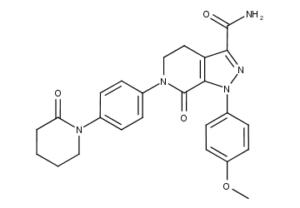Apixaban CAS NO 503612-47-3 Inquire about Apixaban
Tecoland supplies Apixaban bulk active pharmaceutical ingredient (API) to the pharmaceutical industry. Our Apixaban is manufactured by cGMP compliant facility. Welcome to contact us for further details including current DMF status for the product and up to date regulatory status of the manufacturing facility. We look forward to assisting you with your research and development projects.
What is Itraconazole?
Apixaban is used to lower the risk of stroke caused by a blood clot in people with a heart rhythm disorder called atrial fibrillation.
Apixaban is also used after hip or knee replacement surgery to prevent a type of blood clot called deep vein thrombosis (DVT), which can lead to blood clots in the lungs (pulmonary embolism).
Apixaban is also used to treat DVT or pulmonary embolism (PE), and to lower your risk of having a repeat DVT or PE.
Apixaban may also be used for purposes not listed in this medication guide.
Side Effects
Get emergency medical help if you have signs of an allergic reaction: hives; chest pain, wheezing, difficult breathing; feeling light-headed; swelling of your face, lips, tongue, or throat.
Also seek emergency medical attention if you have symptoms of a spinal blood clot such as tingling, numbness, or muscle weakness especially in your legs and feet.
Apixaban may cause serious side effects. Call your doctor at once if you have:
- easy bruising, unusual bleeding (nose, mouth, vagina, or rectum), bleeding from wounds or needle injections, any bleeding that will not stop;
- heavy menstrual bleeding;
- headache, dizziness, weakness, feeling like you might pass out;
- urine that looks red, pink, or brown; or
- black or bloody stools, coughing up blood or vomit that looks like coffee grounds.
How should I take apixaban?
Follow all directions on your prescription label and read all medication guides or instruction sheets. Your doctor may occasionally change your dose. Use the medicine exactly as directed.
You may take apixaban with or without food.
If you cannot swallow a tablet whole, crush it and mix with water, apple juice, or applesauce. Swallow the mixture right away without chewing.
A crushed tablet mixture may also be given through a nasogastric (NG) feeding tube. Read and carefully follow any Instructions for Use provided with your medicine.
Apixaban can make it easier for you to bleed, even from a minor injury. Seek medical attention if you have bleeding that will not stop.
Tell your doctor if you have a planned surgery or dental work. You may need to stop taking apixaban for a short time.
Do not stop taking apixaban unless your doctor tells you to.
If you stop taking apixaban for any reason, your doctor may prescribe another medicine to prevent blood clots.
Store at room temperature away from moisture and heat.
Warnings
Apixaban increases your risk of severe or fatal bleeding, especially if you take certain medicines at the same time (including some over-the-counter medicines). Tell your doctor about all medicines you have recently used.
Call your doctor at once if you have signs of bleeding such as: easy bruising, unusual bleeding, unexpected pain or swelling, feeling very weak or dizzy, bleeding gums, nosebleeds, heavy menstrual bleeding, blood in your urine or stools, coughing up blood or vomit that looks like coffee grounds, or any bleeding that will not stop.
Apixaban can cause a very serious blood clot around your spinal cord that can lead to long-term or permanent paralysis. This type of blood clot can occur during a spinal tap or spinal anesthesia (epidural), especially if you have a genetic spinal defect, if you use a spinal catheter, if you’ve had spinal surgery or repeated spinal taps, or if you use other drugs that can affect blood clotting.
Get emergency medical help if you have symptoms of a spinal cord blood clot such as tingling, numbness, or muscle weakness especially in your legs and feet.
Do not stop taking apixaban unless your doctor tells you to. Stopping suddenly can increase your risk of blood clot or stroke.
Drug Interactions
Sometimes it is not safe to use certain medications at the same time. Some drugs can affect your blood levels of other drugs you take, which may increase side effects or make the medications less effective.
Many other drugs (including some over-the-counter medicines) can increase your risk of bleeding or blood clots. Tell your doctor about all medicines you have recently used, especially:
- any other medicines to treat or prevent blood clots;
- a blood thinner such as heparin or warfarin (Coumadin, Jantoven);
- an antidepressant; or
- aspirin or other NSAID (nonsteroidal anti-inflammatory drug) used long term.
This list is not complete and many other drugs may affect apixaban. This includes prescription and over-the-counter medicines, vitamins, and herbal products. Not all possible drug interactions are listed here.
Disclaimer:
Information on this page is provided for general information purposes. You should not make a clinical treatment decision based on information contained in this page without consulting other references including the package insert of the drug, textbooks and where relevant, expert opinion. We cannot be held responsible for any errors you make in administering drugs mentioned on this page, nor for use of any erroneous information contained on this page.